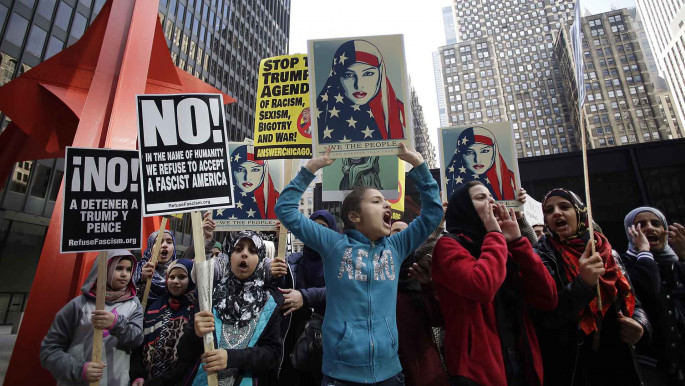'A change for the better': Recognition of Muslim holidays gains ground at US schools
Today, she sees hope in a newer generation of Muslim American school children, whose holidays are increasingly getting recognised in school districts across the country.
"I'm first generation Pakistani-American. I didn't feel a sense of belonging," she tells The New Arab. "I wanted to be part of the Abercrombie culture. Now I'm super proud of my culture."
Over the past several years, she has seen her home city of Anaheim evolve from largely white and conservative to increasingly diverse, with one small area having recently been designated as "Little Arabia" for its cluster of restaurants and other landmarks developed by immigrants from the Middle East and South Asia.
As a trustee for the Anaheim Union High School District, Alkamalee Jabbar is spearheading efforts for official Muslim holiday recognition for the academic calendar.
So far, he has identified around 20 schools in the district where the populations of Muslims are high enough to qualify for observing Muslim holidays (so as not to affect the average daily attendance, which affects school funding).
He is including a range of communities in his research to understand the needs of different faiths in the area, noting that within the Muslim community there are sometimes different ways of observing holidays (with a focus on Eid al-Fitr at this point).
"We're bringing different groups together to find out how they celebrate their holidays," Jabbar told The New Arab. "We're bringing different coalitions together."
 |
When you have communities that come together and learn from one another, you don't have pushback against doing what's right |  |
One of the challenges he has encountered is that Muslim holidays, following the lunar calendar, fall on different dates every year on the Gregorian calendar.
Another challenge is that school districts tend to not label religious holidays, with Christmas and Easter already falling during the winter and spring breaks.
One solution is to have the schools take off personal development days and then tack on extra days at the end of the academic year. He is looking for guidance from the east coast, where a growing number of school districts have over the past several years gained the right to observe Muslim holidays.
In Maryland, the Muslim days off school in several counties began around five years ago.
The campaign for Montgomery County, Maryland began in 2014, resulting in a hard-fought victory (for both Eids) for the Muslim community the following academic year.
"Month after month we'd pack the room," Saqib Ali, a former Maryland state legislator and co-founder of the Equality for Eid Coalition, tells The New Arab about his tactics to make his case at the school board meetings. His group created a website, sent out emails and made appearances on TV advocating for equal representation for school holidays.
"It's a civil rights issue," says Ali. In the end, "They started to feel embarrassed."
He says, "We were one of the early ones. The year before, New York did it, and we used it as an example. Then our neighbouring counties followed. It was a domino effect."
Though counties with high Muslim populations have been making their cases for the inclusion of Muslim holidays in schools, the decisions are not always based on numbers.
For example, Fairfax County in Virginia has a high Muslim population, and so far has not managed to get Muslim holidays off, despite major efforts.
Meanwhile, they are observed at schools in Vermont, one of the whitest states in the country.
 |
| Read more: The challenges of being Muslim in America today |
While the east coast is generally diverse and is home to a growing Muslim community, no place quite compares to Michigan.
Youssef Mosallem, superintendent of Crestwood Schools in Dearborn Heights, where the holiday designations have just started, previously worked for the Dearborn school district, which has been observing Muslim holidays since 2000.
"I was there from the beginning," he tells The New Arab. "We had to create it as we went along."
With Muslims accounting for well over 60 percent of the population in his area, he says it's common for non-Muslims to take part in the holidays.
"Ramadan is so embedded here. In our city, everybody's interconnected," he says.
 |
With Muslims accounting for well over 60 percent of the population in his area, he says it's common for non-Muslims to take part in the holidays |  |
In addition to three days off for Eid al-Fitr this year, to ensure the holiday lands on one taken off by the school district (depending on the position of the moon), he says they also reduce the class and gym workload during Ramadan while many of the students are fasting.
"When you have communities that come together and learn from one another, you don't have pushback against doing what's right," he says.
Back in Anaheim, Ahmed says she feels optimistic about the future of the inclusion of Muslim holidays at schools.
"I think we're changing for the better," she says. "Having Eid as a holiday gives me hope that students will feel that sense of belonging and acceptance."
Brooke Anderson is The New Arab's correspondent in Washington D.C., covering US and international politics, business and culture.
Follow her on Twitter: @Brookethenews





 Follow the Middle East's top stories in English at The New Arab on Google News
Follow the Middle East's top stories in English at The New Arab on Google News


